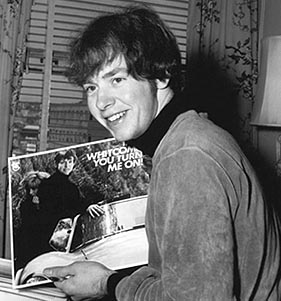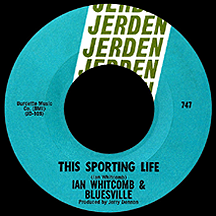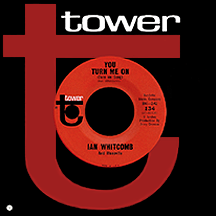IAN WHITCOMB
AND BLUESVILLE
You Turn Me On
So imagine it's 1965 again and here's this guy singing on the radio, 'come on now baby, you know you really turn me on!' in a high-pitched, breathy voice, panting orgasmically, and you're wondering how this strange song ever got past the radio censors (whoever they were), much less became a big hit! Well, don't look at me for the answer. Lesser offenses had been banned from airplay, but then this song was kind of fun. And this much I know: that crazy singer, Ian Whitcomb, was and is a character much deeper than you would imagine based on first impression.
His father played piano and Ian, at a young age, took to pounding the keys, his musical interests expanding to many instruments and types of song. Growing up in Woking, in the U.K. county of Surrey, he was sent to a boarding school in Seaford, an East Sussex town on the nation's south coast, in 1949. Ian loved the music from America that he heard and, as he reached his teens in the mid-1950s, patterned his musical style after the likes of Phil Harris, Johnnie Ray and Elvis. At first singing a cappella with other students at the boarding school, he incorporated guitar and piano playing into his act, forming a skiffle group (as almost every young British musician did in the '50s) and by 1960 or so he put together a group called Bluesville, which included fellow student Barry Richardson playing bass, clarinet and mouth organ. For a time they played small pubs, performing mostly traditional jazz standards and rhythm and blues numbers. One more thing - about this time he took up playing the ukulele.
So taken with the music coming out of the U.S., Ian traveled there in the summer of 1963, winding up in Seattle with a gig as a singer at a coffee house in the city's Pioneer Square. His ukulele playing on comedic songs in the style of George Formby, a star in England during the '30s and '40s, gained him a following and he made a point to plan a return trip to America at the first opportunity. Over the winter, back in England, as the British Invasion was exploding in the States, Ian and Barry worked on audition tapes in hopes of securing a record deal, while finding a market for their live shows in and around Dublin, Ireland. A recording contract failed to appear on home turf, but on a return trip to Seattle the following summer, with everyone stateside on the lookout for the next British star, Ian approached Jerry Dennon, who'd become a force locally, being the first to release The Kingsmen's mega-smash "Louie, Louie" on the Jerden label, which he co-owned with singer Bonnie Guitar. Dennon signed Bluesville to a deal, and a single based loosely on an old folk song, "This Sporting Life," sprang to life between two continents, with the basic recording done in Dublin and Hammond organ overdubs provided by Gerry Roslie of The Sonics added later in Seattle.

Released on Jerden, the big sound of "Sporting Life" made it a hit in Seattle in early 1965, then Capitol Records stepped in, putting it out on the label's Tower subsidiary. The song became a sizeable west coast hit, but not much more. Despite airplay and performances on ABC's Shindig and other shows, it barely scraped the bottom of the national charts. Back in Dublin recording material for an album, the band decided to include a quickie novelty they called "Turn On Song," which got the girls screaming whenever they performed it at clubs around Dublin. With slightly-suggestive lyrics, it didn't occur to them that it would be more than an oddity at the end of the LP. Executives at Capitol in Hollywood felt differently, though, as they spiked it squarely into the middle of 1965, making an immediate impact. The title changed to "You Turn Me On," it hit the national top ten in July...and nowhere that I know of was its sexual nature questioned, much less banned, even after Whitcomb performed it on teen dance shows in a suggestively leg-lifting, writhing demeanor!
He kept up the novelty antics with "N-E-R-V-O-U-S," adding a stutter to his overzealous pursuit of women in song, but in the lyrics the word's letters weren't spelled out as the title suggested; it should have been "N-N-N-Nervous." Bluesville's name was absent from the records starting with this release. Having been a fan of vaudeville and the music of the ragtime era, Ian saw an opportunity to capitalize on it after The New Vaudeville Band achieved a number one hit in late 1966 with "Winchester Cathedral." Within a few weeks of that record's release, Tower was promoting a new version of a catchy novelty tune that had been a hit for Al Jolson a full 50 years earlier, in 1916. "Where Did Robinson Crusoe Go With Friday on Saturday Night?" was credited on the label as Ian Whitcomb and his Seaside Syncopators and in Los Angeles was his hottest song since "You Turn Me On," but it didn't catch on nationally, finalizing his run on the charts at the end of '66, but sparking an obsession for ragtime recordings (as it did for Tiny Tim, leading to that artist's brief success later in the decade) that consumed his energies for a number of years afterward.
Afterwards Ian kept busy, sharing his love of music by writing articles for a variety of magazines and newspapers. In 1972 his book After the Ball was published, covering music's history from the ragtime years to the rock era, receiving positive reviews. He produced an album for Mae West, Great Balls of Fire, consisting of over-the-top oldies remakes and campy contrivances, and composed the music for the 1975 film Bugs Bunny Superstar, a documentary about Warner Brothers' classic Looney Tunes and Merrie Melodies cartoons. This opened the door for more writing assignments, both musical and in print, as well as occasional recording projects, taking Ian Whitcomb well into the 21st century.



